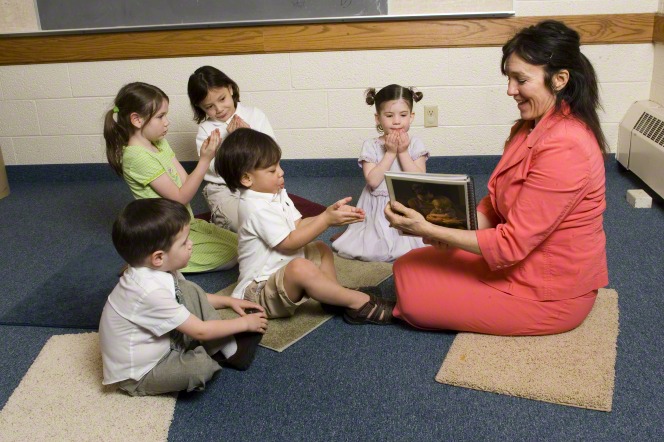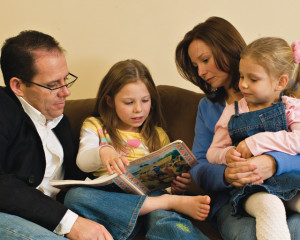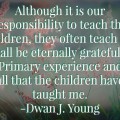Discussions on whether or not Mormon women should hold the priesthood invariably end up with discussions of power. There are some people who think that power should be a person’s goal at church and others who associate power with a person’s place on the organizational chart. When the subject of Mormonism and power comes up, my mind always turns first to the place in Mormonism that is closest to my heart–my work with the children in the Church. It is where I am best able to understand the role of power in Mormonism and in the lives of Mormon women. To me, the concept I am about to describe applies equally to both men and women: Power is not about how high up the chart you are.
When I was fairly new to Mormonism, I began teaching little children. I loved the work and eventually I developed a fair amount of skill. In time, people began coming to me for advice, and I had opportunities to teach classes on how to teach children. During this time, I also had some opportunities to serve as a leader in the children’s organization, which is known as Primary. At first, of course, I wasn’t very good at leading. Well, to be honest, I was awful at it. As usual, though, I got better. We always do if we try hard enough and trust God to teach us how to improve.
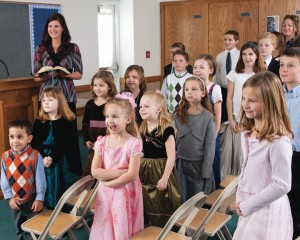 After awhile, I sometimes got called to be a counselor (an assistant to the president of the organization) for the specific purpose of teaching the president how to lead the Primary. In the great Mormon tradition, the president is often someone with no leadership experience or none in the organization she is leading, while the counselors she chooses often have a great deal of experience. I even served as president myself.
After awhile, I sometimes got called to be a counselor (an assistant to the president of the organization) for the specific purpose of teaching the president how to lead the Primary. In the great Mormon tradition, the president is often someone with no leadership experience or none in the organization she is leading, while the counselors she chooses often have a great deal of experience. I even served as president myself.
One time, as I was preparing to move after serving in a leadership role in Primary, I attended my final meeting with the staff and leaders of the Primary. Someone asked if I thought I would be called into Primary in my next congregation and everyone agreed I would—it is sometimes said I have the word Primary written on my forehead. It was noted that I would probably be called as a teacher, being new, and another person asked how it would feel to be demoted to teacher after being a leader.
I was surprised by the question, particularly since that isn’t how most Mormons look at callings. Mormons don’t look at callings as promotions or demotions. They aren’t moved gradually up the ranks through the church. A person who has never lead in the Church can find herself heading up an organization, while last week’s bishop (lay pastor) might be next week’s toddler nursery teacher. The inexperienced leader might well turn out to be more effective at leading due to her personality, her skills, and her experience in other roles inside or outside the church.
Many people think of leadership as power. For a Mormon, leadership isn’t about power; it’s about carrying out God’s work. When a calling is done correctly, only God has power. The rest of us are merely doing the work He asked us to do in the way He asked us to do it. Both the bishop and the teacher of toddlers have authority to carry out their work, but only to carry it out in the way God has outlined it. They don’t accept their roles out of a desire to have power. They accept it from a desire to do God’s work and to serve others. As I have often said in this series, it doesn’t matter where I serve–only that I do.
With this in mind, I suggested that I would consider it a privilege to return to teaching. As I continued to think about this, I thought about my accomplishments in my leadership roles and in my roles as a teacher.
I prefer being a teacher to being a leader. Having been a leader, I understand how critical that role is and how badly Primary runs when a presidency does not do its job correctly. The singing times and the sharing time lessons have a great impact on the children. When I’m a leader, I am happy knowing I can be of service to the children and to the other teachers.
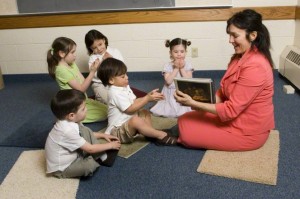 When I am a teacher, though, the impact I have is more personal in terms of the children. Because I am teaching just a few children, I build a personal relationship with each one. I know so much about them. I know their families, the day-to-day events that impact them, their fears, their dreams, and their challenges. When I plan a lesson, I can plan it so that it meets the individual needs of each child, something I can’t do when I plan a sharing time that will need to be taught to a large number of children at once. I feel that I have a more personal impact on their lives.
When I am a teacher, though, the impact I have is more personal in terms of the children. Because I am teaching just a few children, I build a personal relationship with each one. I know so much about them. I know their families, the day-to-day events that impact them, their fears, their dreams, and their challenges. When I plan a lesson, I can plan it so that it meets the individual needs of each child, something I can’t do when I plan a sharing time that will need to be taught to a large number of children at once. I feel that I have a more personal impact on their lives.
This was brought home to me when I taught a child with special needs many years ago. Although she was four, she functioned as an eighteen-month-old. She was included happily in my Primary class, but I made a special effort to get to know her so I could figure out how to reach her and see to it she learned something, however small it might be. When she finally began to talk at age five, she began calling me Sister Church. To her, I was the Church. This, I think, is often true when you are a Primary teacher. For the children, you are the center of their church attendance and your ability to change their lives can be dramatic as a result.
I serve because I want to make a difference and I want that difference to be personal. For this reason, I have seldom found myself wishing for higher positions. The times I’ve been a leader in the Primary, I have felt a step removed from the most powerful position in the Primary. When I have served at a stake (diocese) level, I have been two steps removed from that place. As much as I love and admire the three women who lead the Primary program for the entire world, I would never want to be in their positions. They may be seen by the world as having more power than I do when I sit in a classroom with my seven little preschoolers, but in truth, I am the one with the power that really matters.
I am the one who gets to share the gospel with a small group of children I know so well the lesson can be built just for them. I’m the one they want to hug at the end of class and the one who can answer their own personal questions. They won’t remember who the General Primary president was when they were little, but they might remember me. The General Primary president, despite having done so much for my little students, will probably never meet any of them and will probably never find out if she made a difference in an individual life. Sometimes, I do get to see the results of my work.
Power isn’t a matter of where you sit on the authority chart. It is a matter of your impact on the people you have the opportunity to serve. I don’t need the power that makes me famous. I just want to help a preschooler learn that Jesus loves her. That, to me, is real power—the power to change one individual child’s life.
About Terrie Lynn Bittner
The late Terrie Lynn Bittner—beloved wife, mother, grandmother, and friend—was the author of two homeschooling books and numerous articles, including several that appeared in Latter-day Saint magazines. She became a member of the Church at the age of 17 and began sharing her faith online in 1992.

